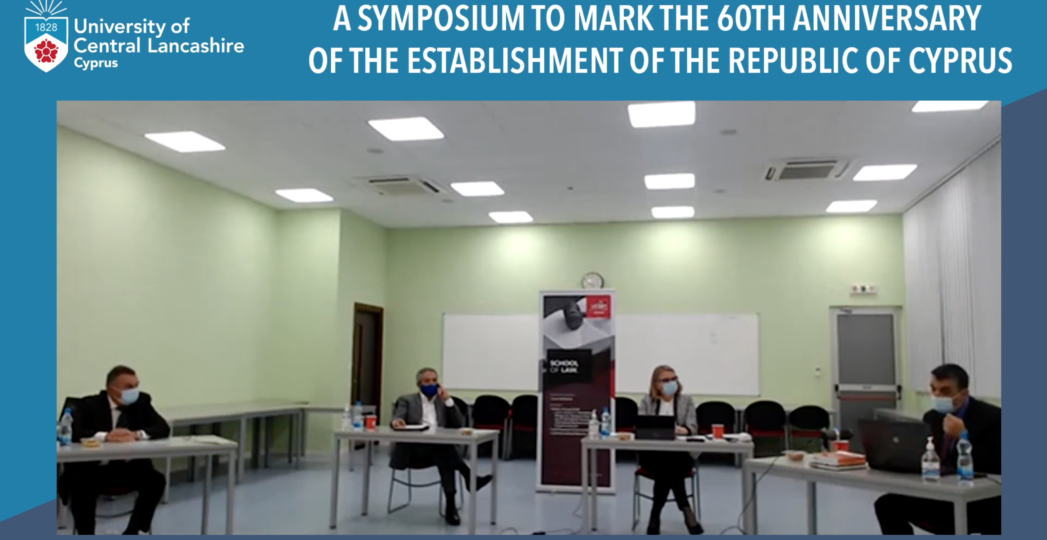On 18 November 2020, the School of Law of the University of Central Lancashire Cyprus (UCLan Cyprus) was privileged to organise and to host a special Symposium. Its overarching purpose was to mark the 60th anniversary of the establishment of the Republic of Cyprus on 16 August 1960.
Due to the ongoing COVID-19 pandemic, the Symposium had to be conducted in an electronic setting with only four of the five speakers participating on campus. Even so, it managed to fulfil its stated aims which were to explore three aspects of the extraordinary state of affairs brought into force in 1960.
The Symposium began with a Welcome Address by the Hon. Judge George Arestis (Ret’d), former Judge of the Supreme Court of Cyprus, former Judge of the Court of Justice of the European Union and Honorary Fellow of the School of Law of the University of Central Lancashire Cyprus (UCLan Cyprus). Judge Arestis set the scene for the three detailed presentations which followed. He did so by placing the establishment of the Republic of Cyprus into wider historical, constitutional and legal context. His Welcome Address can be found here.
The second speaker was Dr Klearchos A. Kyriakides, Assistant Professor and Deputy Head of the School of Law of the University of Central Lancashire Cyprus (UCLan Cyprus). He delivered a presentation under the following title: ‘The cracked colonial foundations of a neo-colonial Constitution’. He advanced a thesis flowing from a formidable body of evidence. At the moment when the Constitution of the Republic of Cyprus came into force in the English language at around midnight on 16 August 1960, it stood on British colonial foundations, which were cracked and, thus, defective. In turn, these British colonial foundations rested on an underlying Ottoman Turkish colonial bedrock, which was likewise cracked and, thus, defective. All of which meant that the Constitution was shot through with cracks, which thereby rendered it defective. The cracks were the outcome of the segregation built into the Constitution. In support of his thesis, Dr Kyriakides explored how segregation became the organising principle which underpinned the law of Ottoman-ruled Cyprus (1571-1878), the law of British-ruled Cyprus (1878-1960) and the Constitution of the Republic of Cyprus (of 1960). His paper can be found here.
The third speaker was Dr Nasia Hadjigeorgiou, Assistant Professor and LLB Course Leader of the School of Law of the University of Central Lancashire Cyprus (UCLan Cyprus). Her presentation was entitled ‘The Sovereign Base Areas and the principle of self-determination: A critical assessment’. She focused on another dimension of the establishment of the Republic of Cyprus in 1960. More particularly, she examined the legal nature of the Sovereign Base Areas in Cyprus, as referred to in the Treaty of Establishment, alongside the Republic of Cyprus. She identified differences between the British and Cypriot positions on this issue and assessed whether the British position as interpreted by the Supreme Court of the United Kingdom – namely that the Sovereign Base Areas are a colony – is compatible with international law. A handout of her presentation can be found here.
The fourth speaker was the Hon. Mr. Justice Costas Clerides (Ret’d), a former Judge of the Supreme Court of Cyprus who served as Attorney-General of the Republic of Cyprus from 2013 until 2020 and is to be the forthcoming recipient of an Honorary Doctorate from the University of Central Lancashire. Mr Justice Clerides delivered a presentation entitled ‘The constitutional status of the Attorney-General, as enshrined in 1960’. He referred to the duality of the functions and powers granted by the 1960 Constitution to the Attorney General, the highest-ranking independent officer in the Republic, the legal adviser of the government and the Public Prosecutor responsible for the handling of all criminal cases. Mr Justice Clerides explained how the powers of the Attorney-General proved to be of crucial importance, especially during the troublesome early years of independence as a result of the problems caused by the bi-communal structure of the state. In his presentation, Mr Justice Clerides drew upon his experience of serving 7 years in the Office of Attorney-General. He did so to highlight the need for even more independence to be given to the Office, particularly in view of the recommendations of the Group of States Against Corruption (GRECO) and the growing demand for disengaging independent law officers from the procedures of the Civil Service. His speech can be found here.
The Symposium ended with a ‘Closing Address’ by Professor Stéphanie Laulhé Shaelou, Head of the School of Law of the University of Central Lancashire Cyprus (UCLan Cyprus). She reminded participants of the intrinsic link between the historical constitutional foundations of the Republic of Cyprus and contemporary legal and political challenges at the national but also international level, begging the question of capacity building to address major constitutional events or crises such as the public health disaster currently unfolding. The role of the Republic of Cyprus in a post-Brexit EU, with multiple constitutional and institutional peculiarities and challenges, was also raised and discussed during the Q&A session with the participants to the Symposium.
The video of the full Symposium is publicly available at the following link:https://youtu.be/ZbNaEoZHD2E
This Symposium was designed for the CPD of professionals in the Republic of Cyprus and internationally. UCLan Cyprus, through its Law School, is an accredited provider of Continuing Professional Development (CPD) programmes under the relevant Cyprus Bar Association scheme. A Certificate of Attendance was awarded to all participants, while the Symposium carried 2 CPD units certified by the Cyprus Bar Association.



